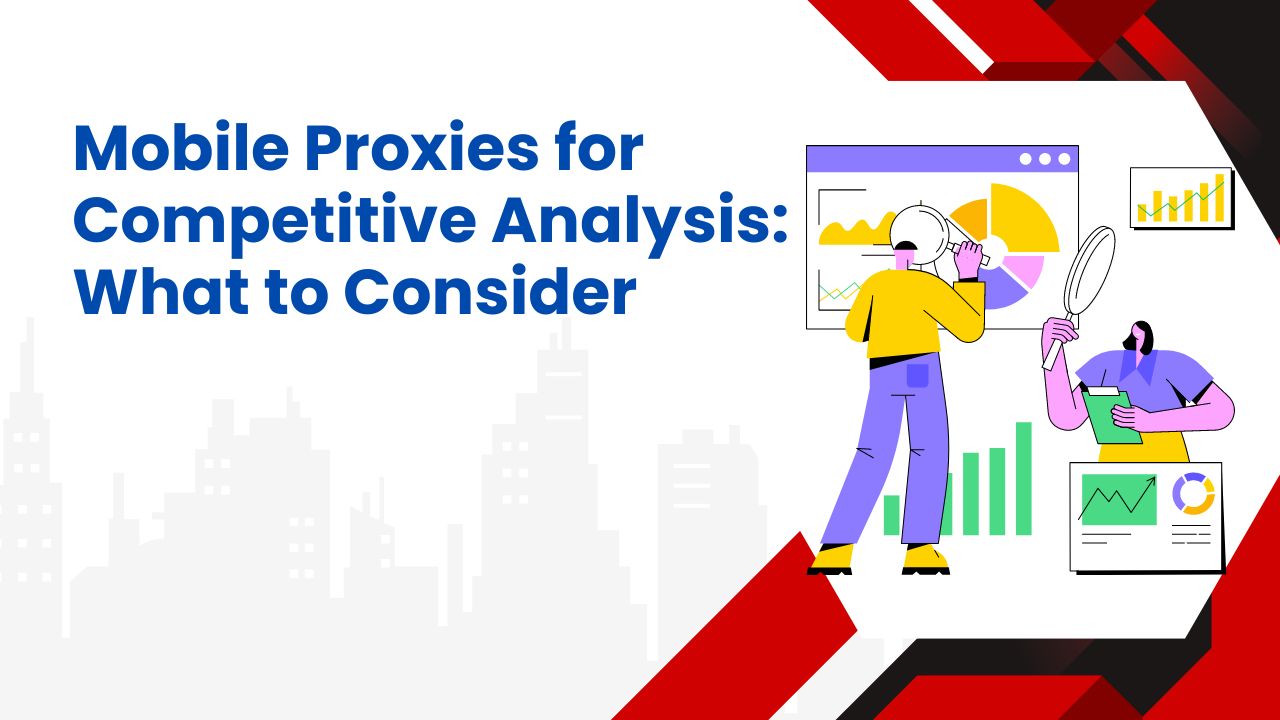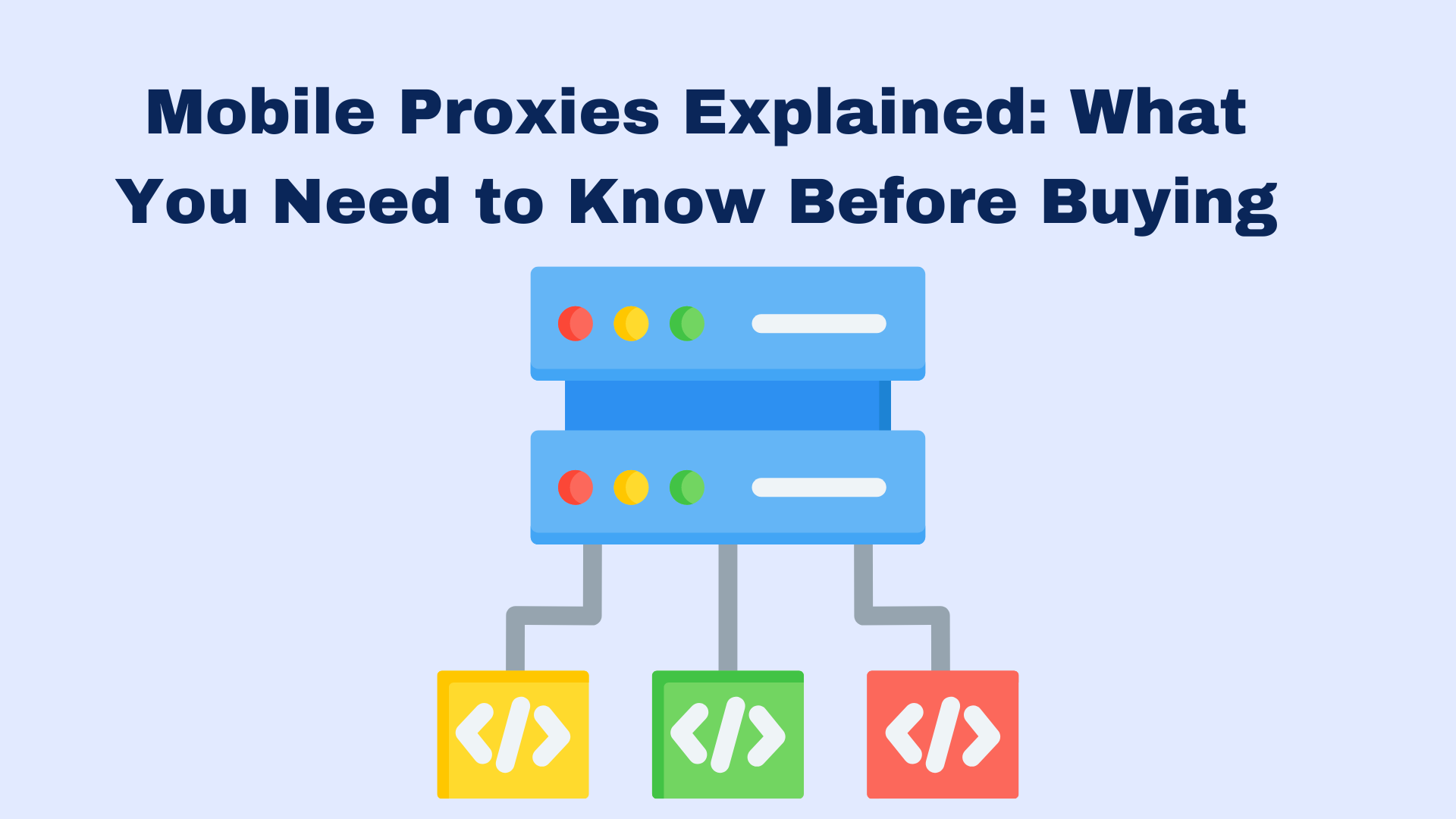In today’s fast-paced digital landscape, businesses are increasingly leveraging mobile proxies for competitive analysis to gain a strategic edge. Whether you’re looking to monitor competitors’ websites, track pricing changes, analyze SEO strategies, or conduct market research, mobile proxies offer an effective solution. However, choosing the right mobile proxy for competitive analysis is crucial to ensure accuracy, security, and effectiveness. This article outlines the key considerations when selecting mobile proxies for competitive analysis in 2024.
1. Authenticity of Mobile IPs
For competitive analysis, it’s essential to use proxies that provide IP addresses sourced from genuine mobile carriers. Authentic mobile IPs mimic real user behavior more closely than data center or residential proxies, reducing the likelihood of detection or blocking by competitors’ websites. This is particularly important when scraping competitors’ data or monitoring their digital activities, as many websites now use advanced detection systems to block non-genuine traffic.
2. Geo-targeting and Location-Specific Analysis
For businesses operating in multiple regions, geo-targeting is a critical feature of mobile proxies. The ability to select IPs from specific countries, regions, or even cities allows for more accurate competitive analysis. For example, you can monitor localized pricing strategies, promotional campaigns, or region-specific content of your competitors. This level of granularity is crucial for companies looking to tailor their strategies to specific markets.
3. Rotating IPs for Anonymity
A successful competitive analysis often requires the ability to perform large-scale data collection over time without being detected. Mobile proxies with rotating IPs are invaluable in this context. By constantly changing IP addresses, rotating proxies help prevent detection and ensure continuous data collection from competitor websites without getting blocked. This feature is especially useful for monitoring dynamic sites that regularly update their content, pricing, or inventory.
4. High Uptime and Reliability
When conducting competitive analysis, downtime can mean missed opportunities and incomplete data sets. Therefore, it is crucial to choose a mobile proxy service that guarantees high uptime, ideally 99% or more. Reliable proxies ensure that your competitive intelligence efforts run smoothly, providing continuous access to competitors’ websites without interruptions.
5. Sticky Sessions for Detailed Data Scraping
While rotating IPs are essential for anonymity, there are times when you need to maintain the same IP for a longer session. This is particularly true for tasks like logging into competitor websites, analyzing user behavior, or gathering detailed data from dynamic sites. Proxies that offer sticky sessions allow you to use the same IP address for a defined period, ensuring consistency in your data collection efforts.
6. Advanced Data Encryption and Security Protocols
Competitive analysis often involves handling sensitive business information, making security a top priority. Look for mobile proxy providers that use advanced encryption techniques and secure protocols to protect your data. End-to-end encryption prevents interception by competitors or malicious actors, ensuring that your competitive analysis remains confidential.
7. User-Agent Management
When conducting competitive analysis, it is important to mimic genuine user behavior as closely as possible. Mobile proxies that allow for user-agent management let you specify the type of device, browser, and operating system associated with your IP. This feature helps in accurately simulating different user experiences and understanding how competitors optimize their websites for various platforms.
8. Flexible and Scalable Proxy Plans
The nature of competitive analysis varies from one business to another. Some companies may need continuous monitoring, while others might require periodic checks. Therefore, it is important to choose a proxy provider that offers flexible and scalable plans. Pay-as-you-go models, monthly subscriptions, or enterprise-level packages ensure that you can scale your proxy usage according to the scope of your competitive analysis project.
9. API Integration for Automated Data Collection
For businesses involved in extensive competitive analysis, API integration is a valuable feature. APIs allow for seamless integration of proxies into your existing data collection tools, enabling automated data scraping, monitoring, and reporting. This saves time and reduces the need for manual intervention, ensuring more efficient and error-free data collection processes.
10. Real-Time Data Collection Capabilities
The digital landscape is constantly changing, and staying ahead of the competition requires real-time insights. Proxies that support real-time data collection are essential for monitoring competitor pricing, product availability, marketing campaigns, and more. Instantaneous access to competitor data enables businesses to make timely and informed decisions.
11. Comprehensive Customer Support
Issues can arise at any time when using proxies for competitive analysis, and prompt resolution is key to maintaining data collection efforts. Choose a provider that offers 24/7 customer support through various channels, such as live chat, email, or phone. Knowledgeable support teams can help troubleshoot problems quickly, ensuring minimal disruption to your competitive intelligence activities.
12. Compliance with Legal and Ethical Standards
While mobile proxies are a powerful tool for competitive analysis, it is important to ensure that their use complies with legal and ethical standards. Engaging in activities like unauthorized data scraping or violating terms of service can lead to legal repercussions. Choose a proxy provider that understands and adheres to these standards and ensure that your competitive analysis strategies are both ethical and compliant with local regulations.



